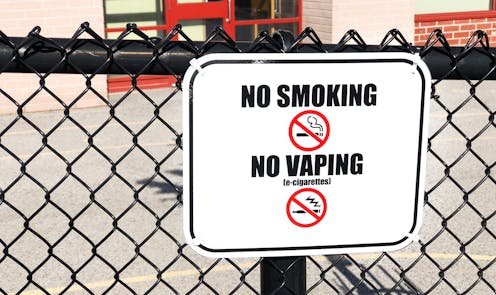
Ontario’s recent education budget announced a “back to basics” funding formula, which includes $30 million to install vape detectors and security upgrades — measures which will expand the surveillance of students in schools.
The province says the budget signals a huge investment in education, but the Canadian Centre for Policy Alternatives notes it cumulatively reflects funds for 4,900 fewer educators in classrooms. The Ontario Secondary School Teachers’ Federation says there’s a cut to funding per student by almost 10 per cent since 2018.
The province’s security investments are fear-driven responses to a real problem: Statistics Canada explains that “vaping to reduce stress has increased during the COVID-19 pandemic for those aged 15 to 19, and was reported as the main reason for vaping within this age group.”
Detectors and other surveillance technologies fail to address the stressors students are coping with, particularly those most vulnerable to systemic neglect. Rationale for their efficacy is also unclear.

(Shutterstock)
Table of Contents
Detector projects moving ahead
Days after Ontario’s announcement, a news report detailed the recent installation of vape detectors in six Peel District high schools. Located in student washrooms, these detectors also capture loud noises that are reviewed by staff in real time.
The Toronto District School Board has also appealed for funding to install detectors.
A May 5 Toronto Star headlined “This school board installed vaping detectors to help kids break the habit. Here’s how its experiment worked — and what other schools can learn from it” reports on a a pilot project in a North Bay school.
Beyond the headline
While the Star headline suggests that detectors were central to addressing vaping, beyond the headline, the story details how the project was part of a comprehensive whole-school approach involving education including assemblies for students, information sessions for staff and in-class lessons.
The inclusion of vape detectors as part of a comprehensive response also echoes the marketing material of corporations selling vape detectors.
The Minister of Education has tweeted media coverage about the North Bay pilot project to rationalize funding more surveillance technology.
Other media headlines have amplified the idea that vape detectors are the key for success in addressing vaping at school.
Privacy issues
Could schools replicate the success of a pilot project in one North Bay school without the surveillance technology of vape detectors? They have a responsibility to try.
Privacy concerns include a lack of transparency with respect to how student data is collected, handled, and used. Detectors used in North Bay and elsewhere, for example, are wireless, and send a notification on an app to the phone of a school staff member to alert them, when activated. Some detectors may offer the option to capture noise.
The use of vape detectors is not limited to Ontario. In Fredericton, New Brunswick, they are also in use.
In a CBC interview, the Director of Schools for the Fredericton Education Centre says their detectors can detect THC, cannabis and loud noises that indicate vandalism. In response to possible privacy concerns, she explained it’s “a system that people have had to get used to over time.”
Ann Cavoukian, former Ontario Privacy Commissioner, warned about the potential for these technologies to dramatically expand.
What are we getting used to?
The American Civil Liberties Union (ACLU) published a recent report “Digital Dystopia: The Danger in Buying What the EdTech Industry is Selling.” The report did not examine vape detectors specifically, but instead evaluated leading products by EdTech surveillance companies; at least one company listed in the report also produces vape detectors. Others offer “aggression detectors,” triggered by sound.
According to the report, companies that sell so-called solutions to school boards, driven by a US$3.8 billion-a-year surveillance industry, promote their products “as a highly effective intervention to keep students safe; “however, there is no independent, unbiased, data-driven evidence that they do so.” Report authors concluded the harms of EdTech surveillance tools outweighed perceived benefits.
The ACLU explains surveillance technology:
- normalizes conduct that contravenes the privacy rights of students, including the right to live free from surveillance;
- erodes trust in adults entrusted to care for them;
- inhibits the development of self-advocacy;
- and increases fear and criminalizes youth through the disciplinary mechanisms used to respond to surveillance.
The report shows surveillance technology harms all students. It harms vulnerable students disproportionately, particularly 2SLGBTQ+, low-income, undocumented, Black, Indigenous, and racialized students and students with disabilities.
Student centred solutions needed
What we don’t fund, we police. It is no coincidence that under a chronically under-funded education system, in a context of deteriorating public supports, we are turning toward intrusive technologies to contain and control the social pain of young people.
As the ACLU outlines, using surveillance technology draws financial and human resources away from effective responses to concerns about safety that centre the dignity and rights of students. And, there are also harms that impact students already vulnerable in the system, including disproportionate exposure to surveillance, discipline and punishment.
Reform needed
Following the announcement of funding for surveillance technology, Ontario announced it intends to introduce legislation to protect children’s privacy and data. While the headline is promising, details are sparse. We need regulatory changes, but changes should not be driven by industry experts with corporate interests nor by police — and safety shouldn’t include expanding ineffective surveillance technology.
As data science researcher Amy Farrow noted, “industry choices have extensive control over student information protection.” Farrow offers policy recommendations that include:
- creating a commission that maintains a panel of experts and representatives within the Ontario Ministry of Education dedicated to protecting students’ information;
- identifying and reviewing commonly used applications and platforms;
- identifying standards and enacting regulations consistent with privacy and data protection legislation, informed by expert bodies.
We have a responsibility to critically interrogate claims of efficacy by EdTech surveillance companies that offer technological solutions to complex social problems — especially when young people are bearing the weight of its harms.
![]()
Beyhan Farhadi does not work for, consult, own shares in or receive funding from any company or organisation that would benefit from this article, and has disclosed no relevant affiliations beyond their academic appointment.






















